Are you looking for the best battery for your travel trailer? One that can provide long-lasting power for all your camping adventures? Look no further. In this article, we will explore the top batteries for RV use, unveiling the secrets to finding the perfect portable power solution for your travel trailer. Get ready to discover reliable, energy-efficient, and high-performance options that will keep you off-grid while enjoying the great outdoors.
Key Takeaways:
- Choosing the best battery for your travel trailer is essential for a reliable power source.
- There are various long-lasting RV batteries and portable power options available.
- The Epoch Batteries 12V 460Ah LiFePo4 and Trojan T-105 are excellent choices for RV house batteries.
- The Jackery Explorer 1000 Plus is a lightweight and durable power station for smaller camper trailers.
- The Goal Zero Yeti PRO 4000 and Nomad 400 make a powerful solar generator combo for RV camping.
Are you ready to discover the best battery for your travel trailer? Let’s dive in!
Understanding RV Batteries
When it comes to RV batteries, it’s essential to understand the different types available. RV house batteries are responsible for powering the appliances, lighting, and air conditioner in your trailer. These batteries are designed to provide a steady and reliable power source for all your onboard needs.
Deep-cycle batteries are another popular option for RVs. These batteries are specifically designed to provide sustained power over a longer period of time. They are ideal for applications that require deep discharges and recharges, such as running appliances and electronics while boondocking or camping off-grid.
Solar generators are standalone power stations that can be used to charge and power various devices in your RV. These generators harness the power of the sun through solar panels to generate electricity. They are a great option for those seeking a renewable and eco-friendly power solution.
Understanding the different types of RV batteries is crucial for choosing the right option that suits your specific needs. Whether you prioritize long-lasting power supply, sustained performance, or the ability to harness solar energy, there is an RV battery that can meet your requirements.
Best RV House Battery: Epoch Batteries 12V 460Ah LiFePo4
For RV enthusiasts seeking the best RV house battery, look no further than the Epoch Batteries 12V 460Ah LiFePo4. This lithium iron phosphate battery offers exceptional performance and durability, making it an ideal choice for powering your travel trailer.
Featuring a smart battery management system, the Epoch Batteries 12V 460Ah LiFePo4 ensures efficient power distribution, maximizing the battery’s lifespan. This intelligent system optimizes charging and discharging processes, protecting the battery from overcharging or excessive discharge.
In addition, the Epoch Batteries 12V 460Ah LiFePo4 is equipped with self-heating capabilities that allow it to operate in extreme temperatures. Whether you’re camping in freezing winter conditions or scorching summer heat, this battery will continue to deliver reliable power.
Furthermore, this lithium iron phosphate battery is IP67 waterproof rated, providing peace of mind during wet camping trips or when encountering unforeseen weather conditions. With its robust construction, the Epoch Batteries 12V 460Ah LiFePo4 can withstand splashes, rain, and even temporary immersion in water.
“The Epoch Batteries 12V 460Ah LiFePo4 offers a perfect balance of performance, longevity, and durability. Its smart battery management system, self-heating capabilities, and IP67 waterproof design make it an exceptional choice for RV enthusiasts.” – Expert Review
It is worth noting that the Epoch Batteries 12V 460Ah LiFePo4 is a larger battery and may not fit in smaller RV battery compartments. Before making a purchase, ensure that your RV has adequate space to accommodate this high-capacity battery.
To provide a comprehensive comparison, the table below highlights key features of the Epoch Batteries 12V 460Ah LiFePo4 and other popular RV house batteries:
| Battery Model | Battery Type | Smart Battery Management System | Self-Heating | Waterproof |
|---|---|---|---|---|
| Epoch Batteries 12V 460Ah LiFePo4 | Lithium Iron Phosphate | Yes | Yes | IP67 |
| Brand X 12V 400Ah AGM | AGM | No | No | No |
| Brand Y 12V 500Ah Flooded | Flooded Lead-Acid | No | No | No |
| Brand Z 12V 600Ah Lithium | Lithium | Yes | No | IP54 |
As seen in the table, the Epoch Batteries 12V 460Ah LiFePo4 stands out with its combination of advanced features, including a smart battery management system, self-heating capabilities, and IP67 waterproof rating. These features ensure reliable power supply and longevity, even in challenging camping conditions.
While the Epoch Batteries 12V 460Ah LiFePo4 may be costlier compared to other options, the superior performance and durability justify the investment for RV enthusiasts seeking the best battery for their travel trailers. Providing peace of mind and dependable power, this lithium iron phosphate battery is undoubtedly a top choice.
Best Value RV House Battery: Trojan T-105
When it comes to finding the best value RV house battery, look no further than the Trojan T-105. This lead-acid battery is known for its exceptional cost-effectiveness and durability, making it a top choice among RV campers. With its impressive performance and affordability, the Trojan T-105 offers an optimal solution for powering your travel trailer.
While lithium batteries may be gaining popularity in the RV community, the Trojan T-105 stands out as a reliable and cost-effective option. Its lead-acid chemistry ensures a sturdy and long-lasting power source for your RV’s electrical needs.
Regular maintenance is crucial to keep the Trojan T-105 in optimal condition. This includes checking the battery’s water levels and cleaning the terminals to prevent corrosion. By following these simple maintenance practices, you can extend the life of your Trojan T-105 and maximize its performance.
Trojan T-105 Specifications
| Specifications | Details |
|---|---|
| Chemistry | Lead-Acid |
| Voltage | 6V |
| Capacity | 225Ah at 20-hour rate |
| Weight | 62 lbs |
| Dimensions (L x W x H) | 10.3″ x 7.1″ x 10.8″ |
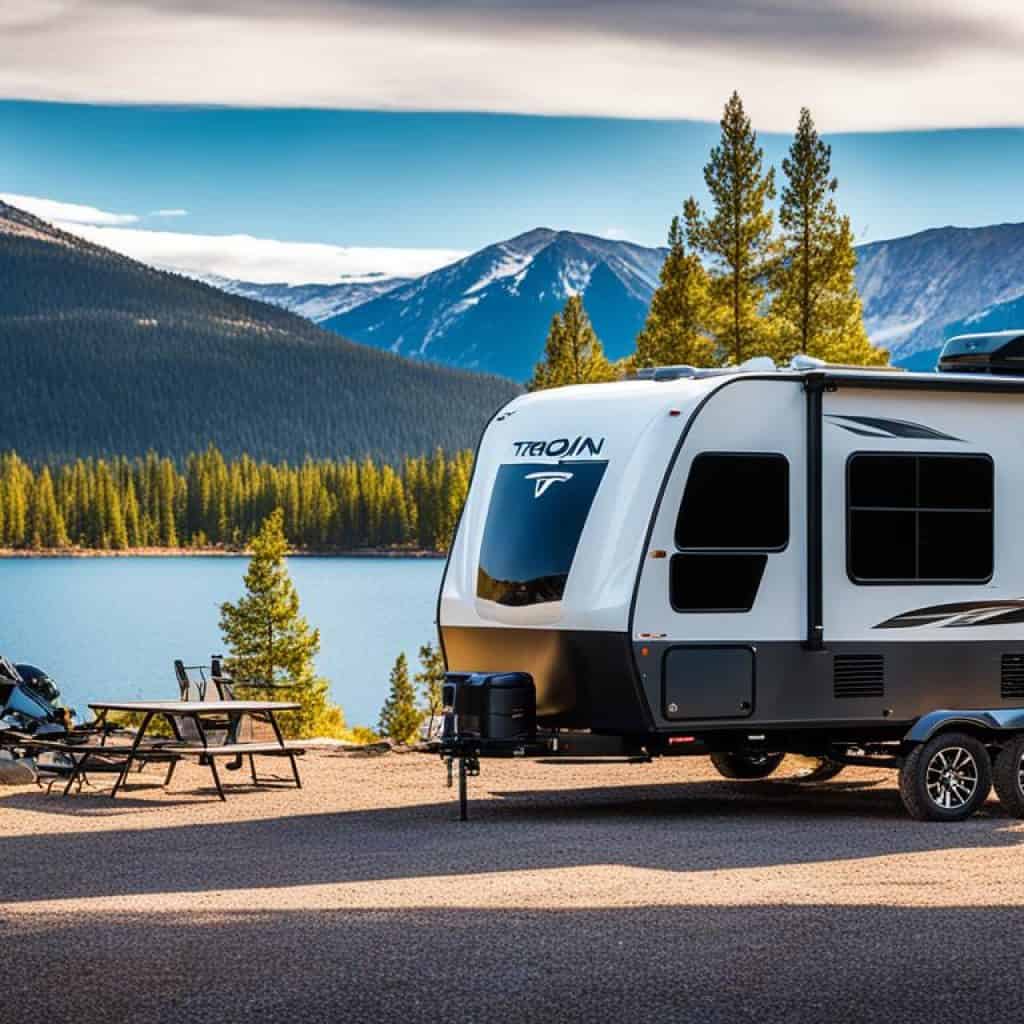
With the Trojan T-105, you don’t have to compromise on quality or break the bank. This reliable lead-acid battery offers a cost-effective option without sacrificing performance. It’s a tried and true choice that has been trusted by RV enthusiasts for years.
While the Trojan T-105 may require regular maintenance, it provides a dependable and efficient power source for your RV’s electrical systems. However, keep in mind that due to its size and weight, it may not be suitable for shipping via certain carriers. Make sure to check the shipping requirements and restrictions before purchasing and transporting the battery.
The Trojan T-105 is an excellent investment for RV owners looking for a budget-friendly yet reliable house battery. Its durability, cost-effectiveness, and proven performance make it a top choice for those seeking optimal value in their RV power solution.
Best Value Power Station: Jackery Explorer 1000 Plus
When it comes to portable power solutions for smaller camper trailers or vans without a built-in power supply, the Jackery Explorer 1000 Plus is the best value power station in the market. This lightweight and durable power station provides reliable power for all your camping needs.
One of the key advantages of the Jackery Explorer 1000 Plus is its portability. Weighing just XX lbs, it is easy to carry and transport, making it perfect for outdoor adventures. Whether you’re camping, hiking, or attending a music festival, this power station is a convenient and reliable source of power.
Not only is the Jackery Explorer 1000 Plus lightweight, but it is also durable and built to withstand tough outdoor conditions. Its rugged design ensures that it can handle bumps, drops, and even splashes of water, making it suitable for various terrains and weather conditions.
The Jackery Explorer 1000 Plus features both AC and DC output ports, allowing you to power a wide range of devices. From charging your smartphones and laptops to running small appliances, this power station has got you covered.
Key Features of the Jackery Explorer 1000 Plus
- Li-ion battery technology for efficient and long-lasting power
- Multiple AC and DC output ports for versatile power options
- Fast charging capabilities from a wall outlet or a car outlet
- Integrated handle and compact design for easy transportation
- Built-in display screen to monitor power usage
“The Jackery Explorer 1000 Plus is the perfect companion for outdoor enthusiasts who value reliability and convenience. Its lightweight and durable design, coupled with its versatile charging capabilities, make it the best value power station for small camper trailers and vans on the market.” – Outdoor Adventurer Magazine
Whether you’re planning a weekend camping trip or embarking on a long road trip, the Jackery Explorer 1000 Plus is the portable power station that delivers on performance and value. Say goodbye to worrying about running out of battery and enjoy your outdoor adventures to the fullest with this reliable power solution.
| Pros | Cons |
|---|---|
| – Lightweight and portable | – May not have enough power for larger appliances |
| – Durable and rugged design | – Higher price compared to entry-level power stations |
| – Multiple AC and DC output ports | – Limited power capacity for extended periods of use |
Best Solar Generator: Goal Zero Yeti PRO 4000 and Nomad 400
Looking for the best solar generator to power your RV camping adventures? The Goal Zero Yeti PRO 4000 and Nomad 400 combination is a powerful and reliable choice. With its high watt-hour capacity and compatibility with solar panels, this solar generator can keep your RV running smoothly, even when off-grid.
One of the key features of the Goal Zero Yeti PRO 4000 is its ability to daisy-chain multiple solar panels. This means you can easily expand your solar power system by connecting additional panels, maximizing your energy production for extended periods of off-grid camping.
The Goal Zero Yeti PRO 4000 is equipped with both AC and DC output ports, allowing you to power a wide range of appliances and devices in your RV. From laptops and smartphones to mini-refrigerators and portable fans, this solar generator has you covered.
To complement the Goal Zero Yeti PRO 4000, the Nomad 400 solar panel is the perfect match. With its high-efficiency solar cells, it can quickly and effectively charge the solar generator, ensuring you have power whenever you need it. The Nomad 400 is lightweight and portable, making it convenient for RV travel.
Whether you’re powering essential appliances or enjoying modern comforts during your RV camping trip, the Goal Zero Yeti PRO 4000 and Nomad 400 are a powerful duo that won’t let you down. Say goodbye to noisy generators and embrace the clean and reliable energy of solar power.
“The Goal Zero Yeti PRO 4000 and Nomad 400 provide an excellent solar power solution for RV camping. With their powerful capabilities and versatile output ports, they offer a convenient and eco-friendly way to power your adventures.” – RV Camping Magazine
Choosing the Right RV Battery
When it comes to powering your RV, selecting the right battery is crucial. There are two main options to consider: a conventional house battery or a standalone power station. Each has its own advantages and considerations, so it’s essential to understand your specific needs before making a decision.
One of the key factors to consider when choosing an RV battery is its capacity, which is measured in Amp Hours (AH). Battery capacity determines how much energy the battery can provide and is directly linked to your power needs. To determine the required battery capacity, you’ll need to calculate the electricity consumption of each appliance and device in your RV.
Here’s a step-by-step guide to help you determine your power needs:
- Make a list of all the appliances and devices you’ll be using in your RV, such as lights, refrigerator, water pump, and entertainment systems.
- Find the power consumption (in watts) of each item either from the manufacturer’s specifications or by using a power meter. Convert the power consumption from watts to ampere by dividing the wattage by the operating voltage (usually 12 volts for RVs).
- Estimate the daily usage time for each device. Multiply the ampere value by the usage time to calculate the daily ampere-hours (AH) consumption for each device.
- Add up the total daily AH consumption to get an idea of your power needs.
Once you have determined your power needs, you can choose a battery with the appropriate capacity to meet those needs. Consider factors such as battery technology, weight, size, and cost when making your decision.
Table: Comparison of Conventional House Batteries and Standalone Power Stations
| Criteria | Conventional House Battery | Standalone Power Station |
|---|---|---|
| Power Capacity | Typically lower capacity | Higher capacity |
| Portability | Less portable, usually permanently installed in the RV | Highly portable, can be easily moved around |
| Charging Options | Charged through the RV’s electrical system or external power sources | Multiple charging options, including solar panels, AC outlets, and car outlets |
| Additional Features | May not have advanced features like integrated inverters or LCD displays | Advanced features like integrated inverters, USB ports, and LCD displays |
Choosing the right RV battery is essential for a reliable and efficient power supply during your RV adventures. Consider your power needs, battery capacity, and the pros and cons of each option before making your decision.
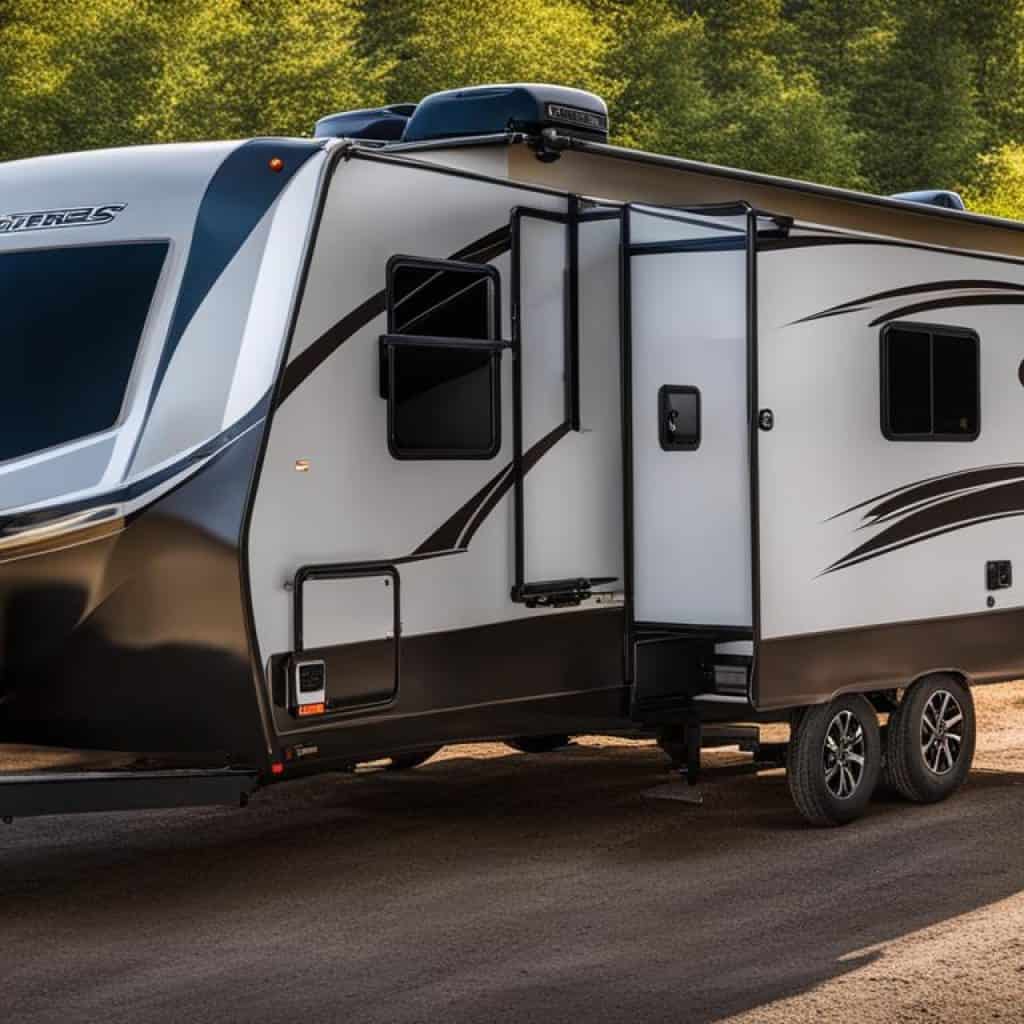
Types of RV Batteries
When it comes to RV batteries, there are three main types to consider: Flooded batteries, AGM (Absorbed Glass Mat) batteries, and Lithium batteries. Each type has its own unique characteristics, making them suitable for different RV power needs.
Flooded Batteries
Flooded batteries, also known as wet cell batteries, are the most affordable option for RV owners. These batteries contain liquid electrolyte, which requires regular maintenance to ensure optimal performance. Additionally, flooded batteries need proper venting to release potentially harmful gases produced during charging.
AGM Batteries
AGM batteries are sealed and maintenance-free, making them a convenient choice for RV enthusiasts. They use a specialized glass mat separator to hold the electrolyte, eliminating the need for watering or electrolyte maintenance. AGM batteries are also resistant to vibration, making them more durable and long-lasting.
Lithium Batteries
Lithium batteries offer numerous advantages for RV owners, such as longer lifespan, higher capacity, and lighter weight. These batteries are a popular choice among off-grid campers, as they can provide reliable power for extended periods. However, it’s important to note that lithium batteries are more expensive than other types and can be affected by freezing temperatures.
When selecting an RV battery, consider your power needs, budget, and other factors such as battery capacity and venting requirements. Each type of battery has its own benefits and considerations, so choose the one that best suits your camping style and preferences.
In the next section, we’ll explore battery capacity and its importance in determining the right battery for your RV.
Battery Capacity and Considerations
When it comes to selecting the right battery for your RV, understanding battery capacity is essential. Battery capacity is measured in Amp Hours (AH) and refers to the amount of energy a battery can provide over a specific period of time.
AGM batteries, including those with thicker lead plates like Golf Cart batteries, typically have higher capacity and longer reserve capacity. This means they can sustain power for a longer duration, making them suitable for RVs with higher power needs. AGM batteries are sealed, maintenance-free, and designed to handle deep discharges, making them a reliable choice for RV enthusiasts.
Lithium batteries, on the other hand, offer exceptional battery capacity and a longer lifespan compared to traditional lead-acid batteries. They are lightweight, provide consistent power output, and can be discharged deeper without the risk of damage. While lithium batteries may be more expensive upfront, they offer a valuable long-term investment due to their extended lifespan and reliable performance.
When choosing a battery for your RV, it’s crucial to consider your power needs. Determine the electricity consumption of each appliance or device in your RV to estimate the required battery capacity. This will ensure you have enough power to meet your needs while camping or boondocking.
Key Considerations:
- Identify your power needs and calculate the required battery capacity in Amp Hours (AH).
- Consider the specific requirements of your RV and the available space for the battery installation.
- Weigh the benefits of AGM batteries with high capacity and longer reserve capacity against the efficiency and longevity of lithium batteries.
- Consult with an RV professional or battery manufacturer to ensure you choose the right battery for your specific camping needs.
To better understand the differences in battery capacity and the various options available, refer to the following table:
| Battery Type | Capacity | Reserve Capacity | Lifespan |
|---|---|---|---|
| AGM Batteries | Varies (Typically higher AH capacity) | Varies (Typically longer reserve capacity) | 5-8 years |
| Lithium Batteries | Varies (Higher AH capacity) | Varies (Longer reserve capacity) | 10-15 years |
Remember, selecting the right battery capacity is crucial to ensure a reliable power source for your RV. Take your power needs and the specific requirements of your camping setup into account to make an informed decision.
Charging RV Batteries
Properly charging your RV batteries is crucial for maintaining their performance and longevity. There are several methods of charging your batteries, including using a converter, solar panels, or a generator. The choice of charging method will depend on the type of battery you have and your camping preferences.
When using a converter to charge your RV batteries, it’s important to note that not all converters are suitable for all battery types. While converters work well with most battery types, such as flooded or AGM batteries, they may not charge them correctly, leading to decreased battery lifespan. Therefore, it’s recommended to follow the manufacturer’s guidelines or consult an expert to ensure compatibility.
Solar charging is an eco-friendly and efficient way to charge your RV batteries. Solar panels capture sunlight and convert it into electricity to charge your batteries. This method is particularly useful for off-grid camping or reducing reliance on traditional power sources. Solar charging is compatible with various battery types, including flooded, AGM, and lithium batteries.
A generator can also be used to charge RV batteries. Generators provide a reliable source of power and can charge your batteries quickly. This method is ideal when you have limited access to sunlight or need to recharge your batteries during unfavorable weather conditions. It’s important to ensure your generator is compatible with your battery type and follow the manufacturer’s recommendations for safe and efficient charging.
To maintain the life of your RV batteries, regular maintenance and proper charging practices are essential. Below are some tips to consider:
- Inspect your batteries regularly for any signs of damage or deterioration.
- Clean the battery terminals and connections to ensure a good electrical connection.
- Avoid overcharging or undercharging your batteries, as this can lead to reduced performance and lifespan.
- Fully charge your batteries before storing them for an extended period.
- Follow the manufacturer’s instructions for optimal charging parameters, especially for lithium batteries.
By following these guidelines, you can ensure that your RV batteries remain in good condition, providing reliable power for all your camping adventures.
Choosing the Right Battery Capacity
When it comes to selecting the battery capacity for your RV, there are two approaches you can take: conservative and liberal.
A conservative approach involves choosing a higher battery capacity to ensure power availability during rainy or cloudy days. This approach provides peace of mind knowing that you have sufficient power even in less ideal weather conditions.
On the other hand, a liberal approach involves selecting a battery capacity based on average power usage. This approach takes into consideration your typical power needs and assumes that you will utilize additional charging methods when necessary.
It’s important to consider various factors when choosing the right battery capacity, such as weight, size, and cost. A higher battery capacity may provide more power, but it can also be heavier, bulkier, and more expensive. Finding the right balance is crucial to meet your power requirements without compromising on other important aspects.
Ultimately, the choice between a conservative or liberal approach depends on your individual power usage, preferences, and camping habits. Analyze your typical power needs and consider the impact of different weather conditions to make an informed decision.
Factors to Consider in Battery Capacity Selection
When evaluating your power needs and choosing the right battery capacity, consider the following factors:
- Power Usage: Calculate the electricity consumption of each appliance and device in your RV to determine your average power usage.
- Battery Lifespan: Higher battery capacity may provide longer battery lifespan as it can handle power fluctuations and deep discharges more effectively.
- Weight and Size: Depending on the available space and weight restrictions in your RV, you may need to balance power needs with the physical dimensions of the battery.
- Cost Considerations: Higher battery capacities often come at a higher price. Consider your budget and evaluate the cost-effectiveness of different options.
By carefully considering these factors, you can make an informed decision and choose the right battery capacity that meets your power needs while keeping other practical considerations in mind.
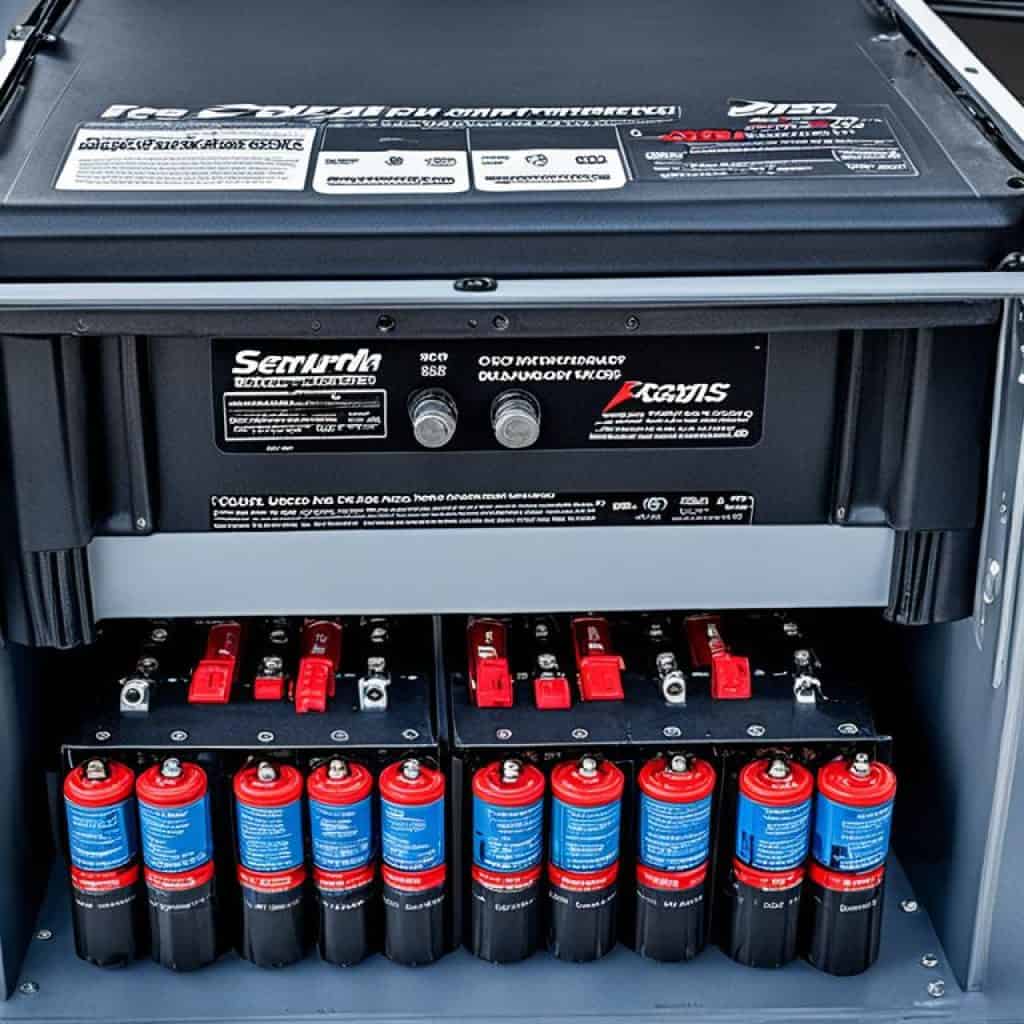
| Conservative Approach | Liberal Approach |
|---|---|
| Higher battery capacity | Battery capacity based on average power usage |
| Ensures power availability in all weather conditions | Additional charging methods required during high power usage |
| Provides peace of mind | Optimizes battery capacity based on average needs |
Affordable Battery Options
When it comes to finding the perfect battery for your RV, affordability is often a key factor. Luckily, there are several affordable battery options available that offer reliable performance and cost-effective solutions for RV owners.
One such option is East Penn Manufacturing, which includes well-known brands like Deka and Duracell. These batteries are designed to provide dependable power and are a popular choice among RV enthusiasts. East Penn Manufacturing offers a range of battery types, including both deep-cycle and starting batteries, to suit different needs.
Trojan is another reputable brand that offers affordable RV batteries. Known for their durability and longevity, Trojan batteries are widely used in the RV community. They are available in various sizes and types, allowing you to find the right fit for your travel trailer.
If you’re looking for a budget-friendly option, Costco batteries are worth considering. Costco offers a selection of affordable batteries that are known for their reliability. While they may not have all the advanced features of higher-end batteries, Costco batteries provide a good balance between price and performance.
“Economical and reliable, these affordable battery options are perfect for RV owners looking for cost-effective solutions without compromising on performance.”
Here’s a comparison table to help you choose the best affordable battery option for your RV:
| Brand | Battery Type | Price Range | Performance |
|---|---|---|---|
| East Penn Manufacturing (Deka and Duracell) | Deep-cycle and starting batteries | Affordable | Dependable |
| Trojan | Deep-cycle batteries | Affordable | Durable and long-lasting |
| Costco | Deep-cycle and starting batteries | Low-cost | Reliable |
Choosing an affordable battery option doesn’t mean compromising on quality. East Penn Manufacturing, Trojan, and Costco batteries offer reliable performance and a cost-effective solution to power your RV adventures. Consider your specific power needs and budget when selecting the best affordable battery option for your travel trailer.
Longevity and Cost Considerations
When it comes to choosing an RV battery, two important factors to consider are battery lifespan and cost. The longevity of a battery determines how long it will last before needing to be replaced, while the price determines the initial investment you’ll need to make.
Some batteries, such as Lithium batteries, are known for their long lifespan. These batteries can last significantly longer than other types, reducing the frequency of replacements. On the other hand, batteries like lead-acid or AGM batteries may have a shorter expected lifespan, requiring more frequent replacements in the long run.
Price is another crucial consideration. Higher-end batteries often come with a higher price tag due to their advanced features and longer lifespan. While they may require a larger upfront investment, they can provide cost savings in the long term by reducing the need for frequent replacements.
It’s essential to consider the expected life cycles of the batteries you’re considering. This information will give you an idea of how long you can expect the battery to function optimally before losing capacity or becoming unreliable. Manufacturers usually provide this information to help consumers make informed decisions.
Battery warranties are also worth considering. A good warranty can provide peace of mind and protect your investment. Take note of the terms and conditions of the warranty, including any limitations or exceptions.
| Battery Type | Lifespan | Price Range | Expected Life Cycles | Warranty |
|---|---|---|---|---|
| Lithium batteries | 10-15 years | High | 2000-5000+ | Varies by manufacturer |
| Lead-acid batteries | 3-5 years | Low | 300-700+ | Varies by manufacturer |
| AGM batteries | 5-8 years | Medium | 1000-2000+ | Varies by manufacturer |
As you can see from the table above, Lithium batteries offer the longest lifespan, but they come with a higher price tag. Lead-acid batteries are more budget-friendly but have a shorter lifespan. AGM batteries offer a balance between lifespan and cost.
Ultimately, the choice between battery lifespan and cost will depend on your individual needs and budget. Consider your camping habits, power requirements, and long-term plans to make an informed decision. Remember to factor in the warranty and expected life cycles to ensure you’re investing in a battery that will provide the best value for your money.
Conclusion
In conclusion, finding the best battery for your travel trailer is crucial for ensuring a reliable power source during your camping adventures. The optimal power solution depends on your specific power needs, preferences, and budget. Whether you prioritize high-performance lithium batteries or cost-effective deep-cycle batteries, consider factors such as battery capacity, lifespan, and charging options.
For those looking for long-lasting and high-performance options, lithium batteries like the Epoch Batteries 12V 460Ah LiFePo4 offer impressive performance with features such as smart battery management systems and self-heating capabilities. However, they may come at a higher price point and may not fit in smaller battery compartments.
Alternatively, cost-effective options like the Trojan T-105 lead-acid battery provide reliable performance and durability. These batteries may require regular maintenance but offer a budget-friendly solution for RV enthusiasts.
Ultimately, the best battery choice is a personal one based on individual preferences. Consider your power needs, camping style, and budget when selecting the optimal power solution for your travel trailer. With the right battery, you can enhance your camping experience with a reliable and efficient power source for all your adventures.
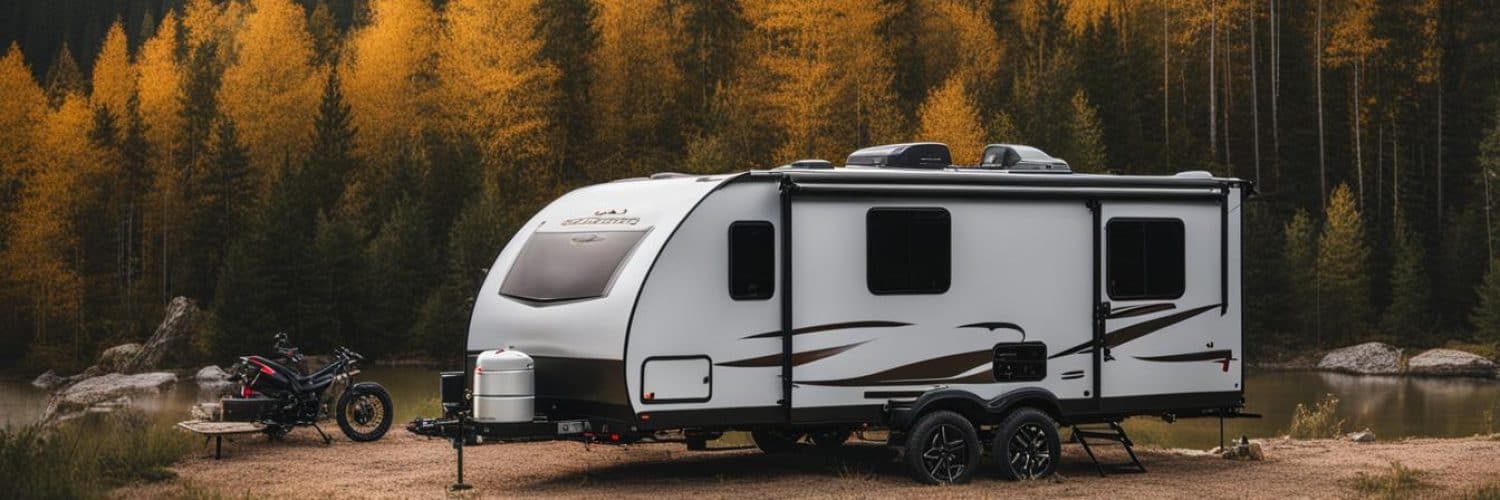

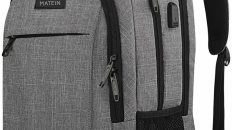




Add comment